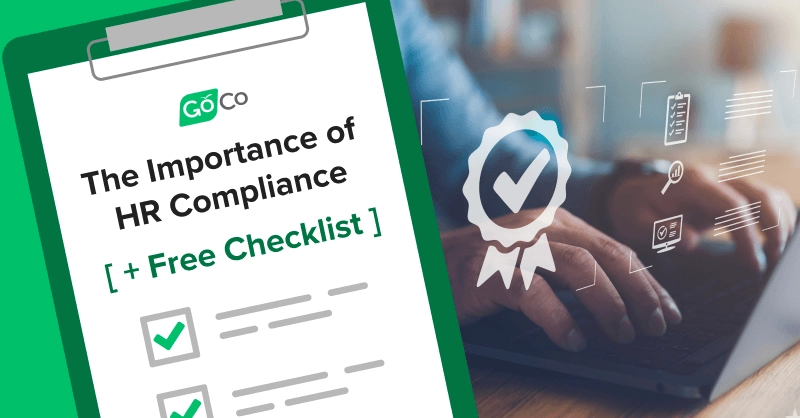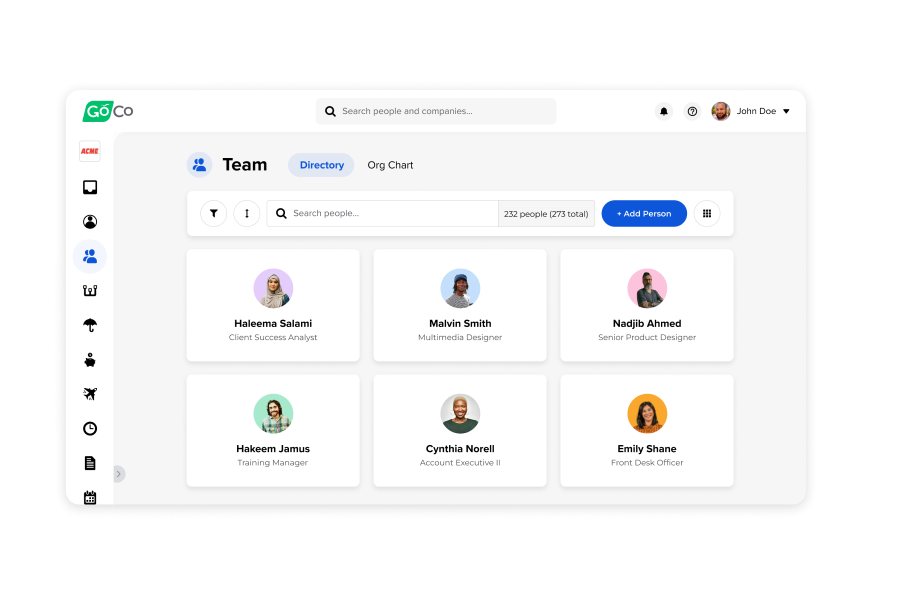Why is HR Compliance Important in 2025? [+Free Checklist]
Compliance has risen to new levels of importance in 2025. Read about the evolution of HR compliance.
by Michael Gugel, CPO @ GoCo - August 2nd, 2024
Every firm must ensure they comply with the laws and standards set by the government and various industries. And every department in a company is responsible for adhering to said regulations. In other words, they need to stay compliant. Similarly, HR compliance plays a significant part in ensuring that a company is fair in its HR practices.
Download the 2025 HR Compliance Calendar
Staying up-to-date with the changing job industry standards is essential, which is why HR compliance laws are revised yearly.
Proper compliance activities influence employee development, retention, and hiring. Understanding your objectives and current growth strategy is essential since it will help you understand how compliance practices may impact decisions or vice versa.
New HR compliance issues have been numerous since the onset of COVID-19. A sharp rise in data breaches raised concerns about employee privacy. Proposed vaccination mandates created uncertainty regarding what control the federal government has over private businesses. Ongoing discussions about minimum wage required many companies to think about the future of their pay structure. All of this is on top of existing struggles, like document retention best practices.
Read on to learn more about the evolution of compliance in 2025, and check out our compliance guide to learn about more HR compliance issues.
What is HR Compliance?
HR compliance is the development of procedures and policies that ensure you carry out fair practices according to law and regulations.
The objective of a firm is to find the compliance sweet spot, i.e., where you adhere to all laws and regulations while ensuring your firm meets human capital resources objectives.
As labor laws evolve, so does HR policy. Subsequently, HR responsibilities also grow, making it hard for HR professionals to keep up. That is why when HR leaders develop HR policies, there are a few things to always keep in mind:
Your business will be subject to audits from enforcing agencies. This may bring about penalties and fines for non-compliance.
Companies must follow all employment laws, including federal, state, and anti-discrimination laws.
Lack of knowledge of compliance obligations is not a legal defense.
Mitigating compliance risks can save your company from lawsuits and subsequent bankruptcy.
As regulatory mandates change, new compliance issues arise. That's why companies must update their HR departments regularly and vice versa.
Tips for Ensuring Compliance in 2025
Keeping your business compliant is critical to its success. However, it can be challenging to stay on top of everything. You can follow three steps to become compliant.
Following an HR compliance calendar facilitates compliance across various functions and allows HR professionals to keep track of important deadlines.
Use HR compliance software that consolidates employee information, leave, and other information into one place.
Engage a professional consultant or HR service to help manage compliance.
2025 Human Resources Compliance Checklist
Here's an HR compliance checklist to help you ensure you get most, if not all, compliance practices right.
Hiring Procedures
Your hiring procedures should include a proper process that provides for offer letters, new hire paperwork, and contracts.
It should include all documents provided upon hiring, emphasizing Title VII, which deals with discrimination against employees for race, religion, sex, color, or national origin. You must ensure you're keeping the Age Discrimination in Employment Act (ADEA) in mind.
Recruiting and Interviewing
The checklist should also include details on new employees' recruiting and interviewing process, along with information on the current job application and job descriptions. This is a requirement for both large and small businesses.
There should be an emphasis on equitable hiring and compliance with the Fair Employment and Housing Act. Furthermore, adherence to the Americans with Disabilities Act (ADA) is equally important.
It should also outline all interview procedures and questions, along with processes for checking references provided by potential hires.
Procedures and Policies
You should also check the company's policies and procedures and the employee handbook. It's best to check that your company is following all laws every once in a while.
To do so, make sure the following are taken care of at all times:
Health Insurance Benefits
COBRA and Unemployment Benefits
Family and Medical Leave Act (FMLA)
Pregnancy Disability Benefits and Leave
Rehabilitation Services
Equal Pay
Drug and Alcohol-Free Workplace Specifications
You can also ensure other issues, like ergonomics problems, are being handled.
Employee Handbook
An employee handbook is essential because it outlines all company-related guidelines. It answers all questions about employee benefits, overtime pay, training programs, etc.
The following are some of the must-have policies in your employee handbook.
An Equal Employment Opportunity policy should follow all laws and regulations.
A cell phone policy should also be in place, detailing its usage during work hours. This can include texting and calling, using social media, taking pictures, setting it on vibrate, etc.
An internet usage policy should also be in place. This would include acceptable online behavior, social media use, language, and exposure. It may also include websites you have to avoid.
It should also include the dress code, detailing what kind of clothing, body accessories, and other products are acceptable.
The handbook should include details on the Fair Labor Standards Act (FLSA), which establishes overtime, minimum wage, child labor laws, employee exemption, and non-exemption.
It should include the Occupational Safety and Health Act (OSHA), which details and sets workplace safety standards and record-keeping compliance programs.
If the company is big enough, it must include the Affordable Care Act (ACA) details, too. It makes sure large companies offer affordable healthcare options to employees.
Another important addition is the Genetic Information Nondiscrimination Act. It forbids discrimination based on family medical history, genetic disposition, and past medical ailments.
Other acts like the Uniformed Services Employment and Reemployment Rights Act (USERRA) should also be included. This ensures that any employee who leaves for military duty can get their job back for up to 5 years.
Sexual Harassment, Drugs, and Workplace Bullying
There should also be regular sexual harassment awareness and training programs. Furthermore, you need to keep a check on workplace bullying. As the number of employees increases, so does the risk of bullying.
There should be measures to report and deal with such behavior. You may also implement a drug-free workplace program.
I-9 Forms
The I-9 form verifies an employee's eligibility to work for your company, so you should have an I-9 for every employee and contractor working for you.
When you hire a new employee, you must fill out an I-9 form. You will have to analyze and record the verification documents provided. You must copy these documents and attach them to the latest I-9 form.
DiSC Program
You have the right to implement a DiSC personality assessment program. It helps companies hire the best possible candidates by measuring specific characteristics.
The characteristics include the following:
Multitaskers
Detail-Oriented
People-Oriented
Hard-Working
Type A
According to the US Department of Labor, companies should also send new hire reports to the state employment agency database.
Working Time and Paid Leave
Any time the employee works for the company counts as working time. Employees have the right to compensation for all work time, whether authorized or not. It can include working from home, having meals, traveling, or working overtime.
Furthermore, the paid leave policy needs to be established and allowed, especially in states like New York, where paid leave is sometimes mandatory.
Unemployment Benefits
HR compliance also includes providing unemployment benefits to people dismissed for performance reasons.
However, people dismissed in the probationary period (under three months) are not eligible to receive these benefits. People who leave without cause or notice or are dismissed for conduct reasons are also ineligible.
Management Training and Webinars
It's essential to provide regular management training to employees. This can be done through webinars, seminars, or old-fashioned classroom training programs.
The primary concerns to be addressed should include the following:
Performance appraisals and feedback
Managing and handling difficult employees
Counseling, dismissing and helping employees
Training all employees in diversity and harassment
The purpose of management training isn't just to help managers - the management is expected to provide the training they received to employees under them.
How GoCo Can Help
Every successful company will have one thing in common - complete HR compliance. Since employees are the most crucial part of a company, you must ensure they're satisfied and happy.
HR laws and regulations are there to ensure you avoid making mistakes. Following them makes sure you provide equal opportunity, suitable working environments, and appropriate compensation packages. All-in-one HR platforms like GoCo streamline the compliance process by digitally storing and organizing all essential documents for your team.
Even if you don't have a dedicated human resources department, you can use GoCo to help manage employment eligibility, federal and state tax documents, benefits compliance, ACA compliance, and PTO compliance. Take a tour today, and never worry about HR compliance again.
Updated 08/02/2024

Subscribe to Beyond The Desk to get insights, important dates, and a healthy dose of HR fun straight to your inbox.
Subscribe hereRecommended Posts
Search...
Product
GoCo
Resources
Articles
eBooks
Webinars
Customer Stories






